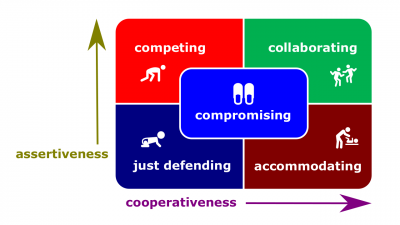Difference between revisions of "Accommodating intent"
| (One intermediate revision by one other user not shown) | |||
| Line 1: | Line 1: | ||
| − | [[Accommodating intent]] (or, simply, [[accommodating]]) is the willingness of one party in a conflict to place the opponent's interests above his or her own. | + | [[File:Conflict-intentions.png|400px|thumb|right|[[Conflict intention]]s]][[Accommodating intent]] (or, simply, [[accommodating]]) is the willingness of one party in a conflict to place the opponent's interests above his or her own. |
| Line 5: | Line 5: | ||
According to [[Organizational Behavior by Robbins and Judge (17th edition)]], | According to [[Organizational Behavior by Robbins and Judge (17th edition)]], | ||
::[[Accommodating]]. The willingness of one party in a conflict to place the opponent's interests above his or her own. | ::[[Accommodating]]. The willingness of one party in a conflict to place the opponent's interests above his or her own. | ||
| + | According to [[Looking Out, Looking In by Adler, Proctor (15th edition)]], | ||
| + | :[[Accommodating]]. A lose-win conflict style in which the communicator submits to a situation rather than attempts to have his or her needs met. | ||
==Related concepts== | ==Related concepts== | ||
| Line 12: | Line 14: | ||
*[[Social Rationale Quarter]]. | *[[Social Rationale Quarter]]. | ||
| − | [[Category: Septem Artes Administrativi]][[Category: Articles]] | + | [[Category: Septem Artes Administrativi]][[Category: Articles]][[Category: Human Communications]] |
Latest revision as of 14:45, 9 July 2020
Accommodating intent (or, simply, accommodating) is the willingness of one party in a conflict to place the opponent's interests above his or her own.
Definitions
According to Organizational Behavior by Robbins and Judge (17th edition),
- Accommodating. The willingness of one party in a conflict to place the opponent's interests above his or her own.
According to Looking Out, Looking In by Adler, Proctor (15th edition),
- Accommodating. A lose-win conflict style in which the communicator submits to a situation rather than attempts to have his or her needs met.
